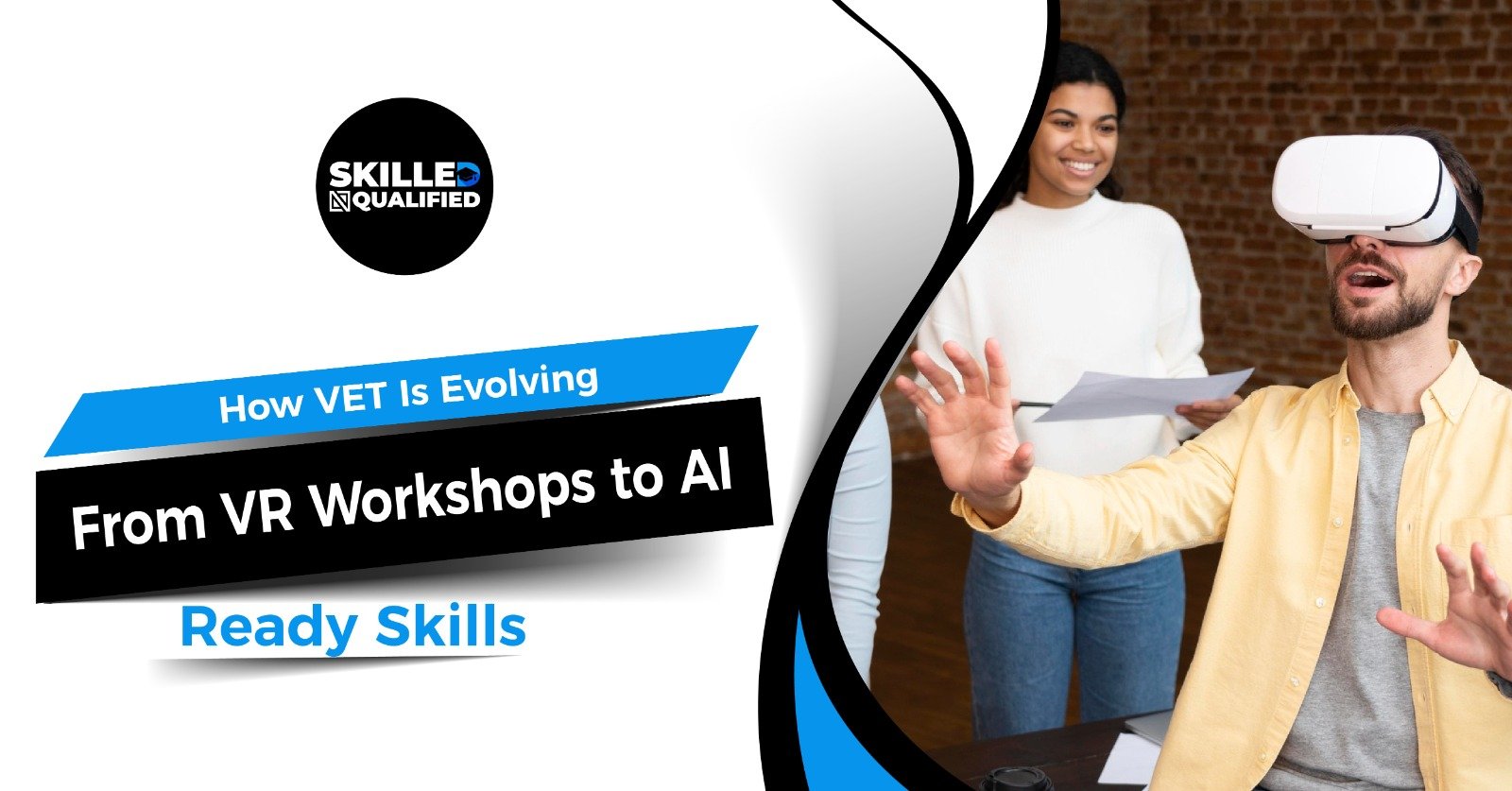The world of work is changing, and Australia’s Vocational Education and Training (VET) sector is evolving with it. From virtual reality simulations in classrooms to AI-integrated learning pathways, today’s VET programs are preparing students for the tech-driven workforce of tomorrow. But what does that mean for skilled professionals and the Recognition of Prior Learning (RPL) process?
In this blog, we’ll explore how VET in Australia is embracing innovation, how RPL fits into this futuristic shift, and how SNQ (Skilled N Qualified) is staying ahead of the curve to help you get certified with the latest industry-ready skills.
What Is VET and Why Is It Important?
Vocational Education and Training (VET) delivers job-focused education to equip learners with practical skills in sectors like construction, healthcare, hospitality, community services, and IT. Governed by ASQA and aligned with the Australian Qualifications Framework (AQF), VET is vital to supplying Australia’s workforce with competent, job-ready professionals.
But in 2025, it’s not just about competency—it’s about being digitally literate, tech-enabled, and adaptable to innovation.
Key Innovations Transforming the VET Sector
Keywords: future of VET, VR in training, AI skills Australia, tech-enabled workforce
1. Virtual Reality (VR) Training Environments
Modern trade and service training now includes VR workshops, enabling students to simulate complex tasks in carpentry, plumbing, nursing, and even automotive repair without physical risk.
2. AI-Based Personalised Learning
AI algorithms are being used to customise learning plans based on individual student pace, performance, and skill gaps—making training more personalised and efficient.
3. Online and Remote Learning Flexibility
Remote platforms now host interactive modules, video lessons, assessments, and instructor feedback—all accessible from anywhere in Australia. This is especially useful for rural and FIFO (fly-in-fly-out) workers.
4. Digital Credentialing and Blockchain Certificates
Certifications are increasingly issued through secure digital platforms, making credentials easier to verify and more tamper-proof, using blockchain-based validation.
5. Industry Collaboration and Rapid Course Updates
Courses are being updated in real-time to match fast-evolving industry needs (e.g. renewable energy, cybersecurity, automated machinery), ensuring future-ready content.
The Rise of AI-Ready Skills
Keywords: AI skills Australia, future skills 2025, tech-ready workforce
Jobs of the future demand a hybrid skillset:
- Digital literacy
- Problem-solving with automation tools
- Understanding AI-based systems and processes
- Using data in real-time decision-making
- Adaptability across platforms and technologies
VET is now actively embedding these core competencies into trade and service qualifications—so future workers are not just hands-on, but also digitally aligned.
Where Does RPL Fit in This Future-Facing Framework?
Many experienced workers already use technology daily—but may not hold formal certification. That’s where Recognition of Prior Learning (RPL) becomes even more powerful in today’s VET environment.
How RPL Supports Innovation in VET:
- Certifies real-world skills, including tech-based tasks
- Recognises workplace use of digital tools and software
- Eliminates the need to retrain in areas where you’re already competent
- Aligns experience with future-proof qualifications
Whether you’ve managed smart security systems, used CRM tools in admin, or diagnosed vehicles with digital scanners—RPL validates your tech-enabled work history.
SNQ’s Role in the New Era of VET
At Skilled N Qualified (SNQ), we’re more than just an RPL agency—we’re a future-aligned qualification partner helping Australian professionals gain recognition in a changing landscape.
Here’s how SNQ stays ahead:
- We work with tech-forward RTOs offering AI-relevant and digitally aligned qualifications.
- Our consultants understand future industry trends, ensuring you pursue qualifications that still matter 5–10 years from now.
- We streamline RPL processes so you can avoid unnecessary learning and move straight to certification.
- We offer guidance on licensing and career upgrades, especially in digital trades.
SNQ’s approach is not about just checking boxes—it’s about positioning you strategically for what’s next.
Popular Qualifications in Future-Facing Industries
Keywords: tech skills VET Australia, RPL digital trades, future jobs Australia
1. Electrotechnology & Automation
- Apply your knowledge of digital electrical systems, automation, or smart devices.
- Qualification: UEE30820 – Electrotechnology Electrician
2. Community Services & Health Tech
- Get recognised for using telehealth, client management software, and digital compliance platforms.
- Qualification: CHC52021 – Diploma of Community Services
3. Automotive & Diagnostics
- If you use computer-based diagnostic tools, your work already involves tech.
- Qualification: AUR50116 – Diploma of Automotive Technology
4. Business & Digital Leadership
- Digital transformation, CRM tools, marketing analytics, and project software all apply.
- Qualification: BSB50420 – Diploma of Leadership and Management
5. Construction Tech
- Recognise your skills in 3D modelling, site management apps, or estimating software.
- Qualification: CPC40120 – Certificate IV in Building and Construction
Benefits of RPL in the Evolving VET Ecosystem
- No study required if you already know the skills
- Get qualified faster and more affordably
- Match your certification with today’s workplace demands
- Stay competitive and future-proof your career
- Avoid outdated training that doesn’t apply anymore
Final Thoughts
The future of vocational education in Australia is innovative, digital, and responsive. While traditional learning still plays a role, modern VET prioritises real-world skills and future-ready competencies.
RPL bridges the gap between what you already do and what formal qualifications demand. And with SNQ as your strategic partner, you won’t just be recognised for the past—you’ll be prepared for the future.


